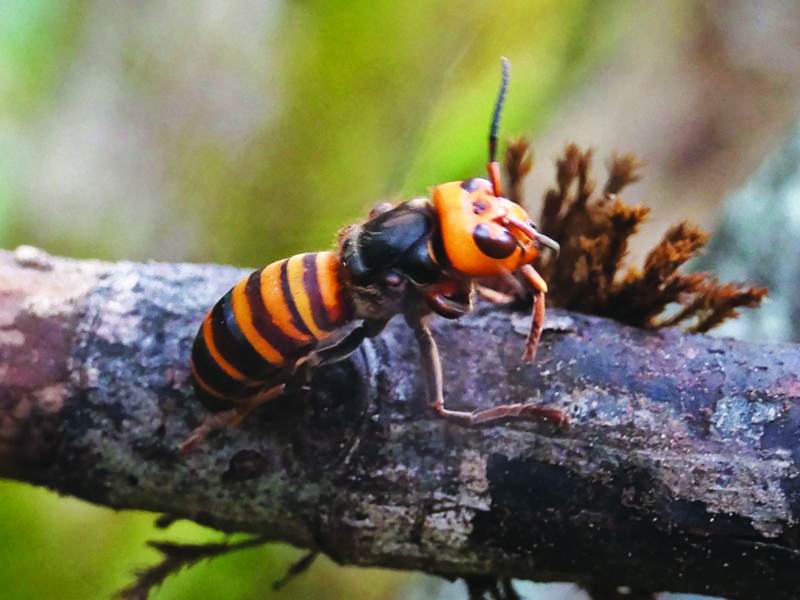PRINCE GEORGE – If you want to catch a bee, ask a beekeeper to help.
That’s the strategy provincial apiculturist Paul van Westendorp used when two Asian giant hornets were spotted and captured at a Nanaimo-area apiary in September, and it’s a good thing he did.
“This is a totally other creature,” van Westendorp told delegates to the BC Honey Producers Association annual general meeting in Prince George, October 4-6. “It is the apex insect predator – the ultimate insect hunter. They can destroy a commercial honeybee hive in less than an hour.”
Asian giant hornets include a number of insects in the Vespa genus, van Westendorp explains.
“The one we saw in Nanaimo, Vespa mandarinia, is a ground-nester,” he says.
The hornets raid a colony by biting and dismembering young bees and then steal the bee brood and turn it into “protein meatballs” to bring back to their nests, van Westendorp continues.
“We have full confidence that if they establish themselves in BC, beekeepers will be able to deal with them effectively,” he says. “These insects have an oversize head and you will be able to screen for them.”
But that is not the least of it.
The hornets are also a threat to livestock and wildlife, not to mention humans. People typically provoke attacks when they unwittingly disturb a nest.
“In Japan, there are 40 to 60 human fatalities each year from sting attacks,” van Westendorp says, noting just a few dozen can cause trouble. “Each hornet can sting multiple times and their venom contains a cytolytic peptide that will cause tissue damage and bleeding.”
He says one of the beekeepers involved in the eradication mission was stung several times through his beekeepers outfit, and there were open wounds on his legs.
Nanaimo beekeepers knew what to do, however. Van Westendorp reached out to them after four additional sightings, aside from at the apiary.
“I contacted them for help after the sightings, and after confirming with different agencies the insect we were dealing with,” says van Westendorp. “They did a fantastic job.”
The Nanaimo squad mapped where the sightings were, considered the insect’s behaviour, and calculated where to look.
“They found the nest in the forest within a couple of hours,” he says. “It’s a grand story and the beekeepers deserve all the credit.”
Some 100 hornets were gassed with CO2 at dusk, dug out of the nest and soaked in alcohol to preserve them. There were drones, but no virgin queens were found, confirming that the nest had not had time to develop to a point that the insects would spread.
“That’s not the end of it,” says van Westendorp, adding that it is suspected they arrived via the port of Nanaimo.
“We need to be vigilant in 2020 to make sure that they did not establish themselves,” he says, noting that the climate can’t be counted on to curtail the pests. “I’ve seen nest cone that has been in a fridge for 24 hours and a freezer for 24 hours and the brood were still wiggling.”
The rest of van Westendorp’s report was not as dramatic.
He says he was happy with the responses to the province’s annual spring survey that went out to the 403 beekeepers who are registered to have 10 colonies or more.
“We received 155 online responses for a total of 39% returned, which I consider excellent,” he says.
The survey noted 54,000 colonies went into the winter of 2018, with 37,000 surviving in the spring, for a 32% winter mortality. Van Westendorp says the weather was a key factor in those losses.
“We had virtually no winter until January 26, when the temperature suddenly dropped into the basement and we had strong Arctic outflows for about six weeks,” he notes. “That really sucked the life out of a lot of colonies, particularly those on the coast that are not accustomed to such extreme weather conditions. They ran out of fuel.”
Van Westendorp reminded beekeepers of the need for a veterinarian’s prescription to purchase any of the three antibiotics that are registered for use in bee colonies.
“You need to establish a relationship with your local vet and perhaps the local club can work with the vet as well, to coordinate with smaller backyard beekeepers,” he says.
There was an increase in the incidence of EFB (European Foul Brood) disease noted in samples that were tested across the province.
Some EFB was recorded after blueberry pollination, but much more after the dearth period that occurred in the late spring when cold weather limited flower production and bees began running out of food.
“As soon as the nectar flow resumed, the EFB disappeared completely,” van Westendorp says.
There does not appear to have been an increase in the occurrence of Nosema, adds van Westendorp, with the highest levels continuing to be in coastal BC. The antibiotic Fumagillin is being re-introduced in Canada and is available through the Alberta Honey Producers Co-operative.
“But I have heard some concerns that it is not as benign as we have always believed,” says van Westendorp.
A mystery disease has struck a number of colonies in the Kootenays. First vice-president Jeff Lee of Honey Bee Zen Apiaries in Creston lost 300 hives this year.
“We simply do not know what is going on. It appears to be a combination of varroa mites and viruses that seem to be working together,” says van Westendorp. “They are making it very miserable for our bees to survive.”
Small hive beetle was not detected in the Fraser Valley this year, says van Westendorp. But he has seen photographs from beekeepers in Bellingham who have found adults.
There will be a free webinar series, “Introduction to Beekeeping,” offered Saturday mornings in January and February 2020. A master course will be held at UBC on February 10


 New skills needed for technology-driven agriculture
New skills needed for technology-driven agriculture